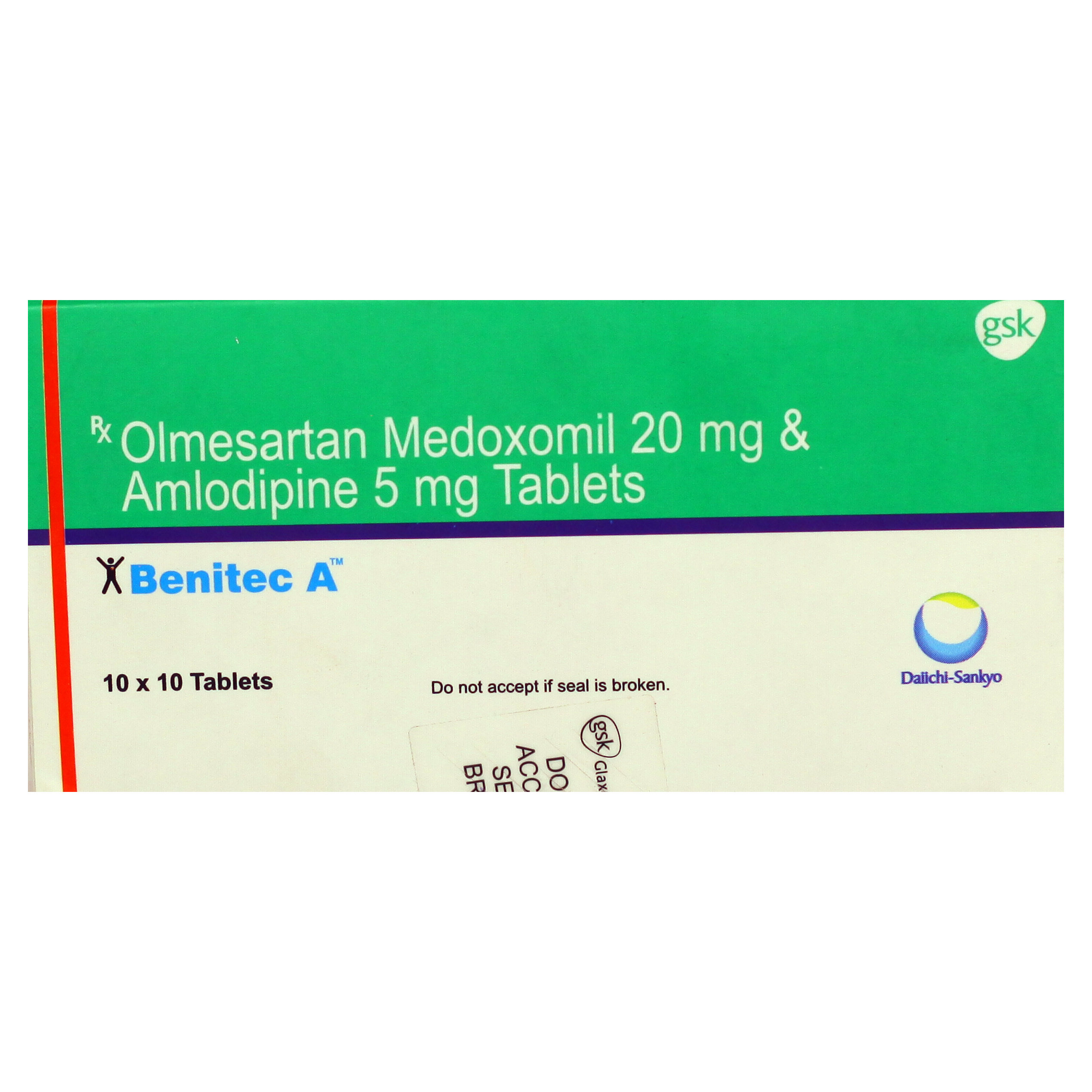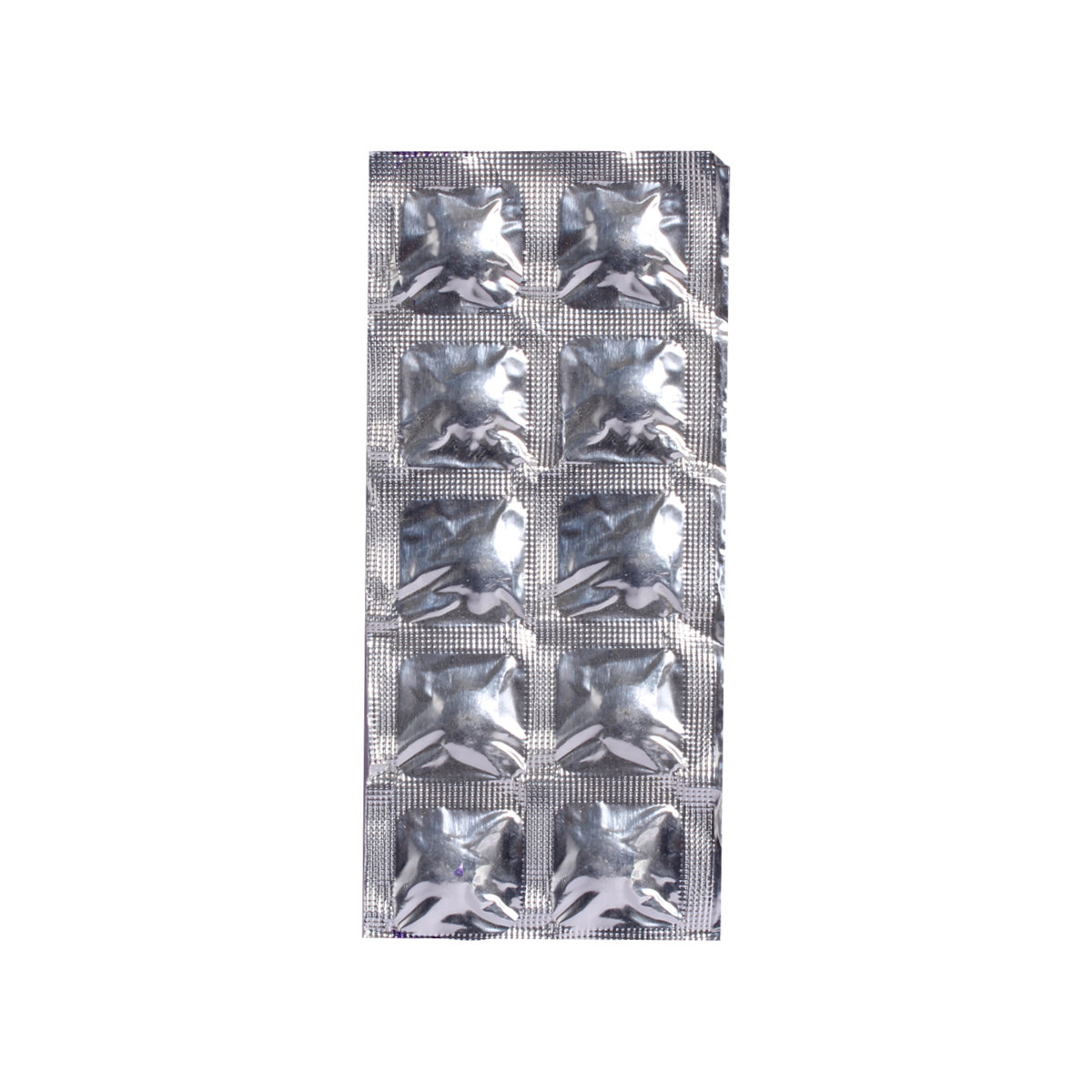Olmesartan Medoxomil+amlodipine
About Olmesartan Medoxomil+amlodipine
Amlodipine+olmesartan Medoxomil is a combination of medication containing blood pressure-lowering medicines primarily used to treat high blood pressure. Amlodipine+olmesartan Medoxomil is used alone or in combination with other blood pressure-lowering medications. Hypertension or high blood pressure is a chronic condition in which the blood's force against the artery wall is high. As a result, it leads to heart disease, irregular heartbeat, and other complications.
Amlodipine+olmesartan Medoxomil contains Olmesartan (angiotensin receptor blocker) and Amlodipine (calcium channel blocker). Olmesartan works by blocking the hormone angiotensin, thereby relaxing blood vessels. This allows the blood to flow more smoothly and the heart to pump more efficiently. Amlodipine, on the other hand, acts by relaxing the blood vessels. This reduces the heart's workload and makes the heart more efficient at pumping blood throughout the body. Thus, both help lower high blood pressure, reducing heart attack or stroke chances.
You can take Amlodipine+olmesartan Medoxomil with food or without food with a glass of water. Do not chew, bite, or break it. Your doctor will advise you on how often you should take your tablets based on your medical condition. In some cases, you may experience headaches, drowsiness, ankle swelling, nausea, dizziness, and low blood pressure. Most of these side effects of Amlodipine+olmesartan Medoxomil do not require medical attention and gradually resolve over time. However, if the side effects are persistent, reach out to your doctor. It is advisable to drink plenty of fluids while taking Amlodipine+olmesartan Medoxomil.
Try not to stop taking Amlodipine+olmesartan Medoxomil on your own. Inform your doctor, and your dose might be gradually lowered to avoid a rise in blood pressure and increase the risk of heart disease and stroke. Inform your doctor if you are suffering from kidney, liver, heart disease, or diabetes. If you are pregnant or breastfeeding, please tell your doctor, as it is not recommended in pregnancy. It should not be given to children less than 12 years of age. Do not use Amlodipine+olmesartan Medoxomil if you have low blood pressure (hypotension) or cardiogenic shock (sudden stopping blood flow to the heart). Please tell your doctor if you are taking any other medicines or are allergic to the Amlodipine+olmesartan Medoxomil. Reducing the amount of table salt (sodium chloride) in your food often relieves the body's swelling. Grapefruit juice and St. John's wort plant should not be consumed when taking Amlodipine+olmesartan Medoxomil as it is contraindicated.
Uses of Olmesartan Medoxomil+amlodipine
Medicinal Benefits
Amlodipine+olmesartan Medoxomil contains Olmesartan (angiotensin receptor blocker) and Amlodipine (calcium channel blocker). Olmesartan works by blocking the hormone angiotensin, thereby relaxing blood vessels. This allows the blood to flow more smoothly and the heart to pump more efficiently. Amlodipine, on the other hand, acts by relaxing the blood vessels. This reduces the heart's workload and makes the heart more efficient at pumping blood throughout the body. Thus, both help lower high blood pressure, reducing future heart attack or stroke chances.
Directions for Use
Storage
Side Effects of Olmesartan Medoxomil+amlodipine
- Headaches
- Drowsiness
- Ankle swelling
- Nausea
- Dizziness
- Low blood pressure
Drug Warnings
Amlodipine+olmesartan Medoxomil should not be given to the people allergic to Amlodipine+olmesartan Medoxomil or may of its ingredients. If you have low blood pressure (less than 90 mm of Hg), have had a heart attack, kidney disease, liver disease, are pregnant, or planning to get pregnant and breastfeeding women; do not take Amlodipine+olmesartan Medoxomil. Besides this, it is contraindicated in low blood pressure (hypotension), cardiogenic shock (sudden stopping of blood flow to the heart), and aortic stenosis (heart valve problem). Amlodipine+olmesartan Medoxomil can pass into breast milk, but its effect on the baby is not known. So, it is better to tell your doctor if you are taking Amlodipine+olmesartan Medoxomil and breastfeeding. Grapefruit juice and St. John's wort plant should not be consumed when taking Amlodipine+olmesartan Medoxomil as it is contraindicated. Drinking alcohol while using Amlodipine+olmesartan Medoxomil can cause you to have low blood pressure, so avoid alcoholic beverages.
Drug Interactions
Drug-Drug Interactions: Amlodipine+olmesartan Medoxomil may interact with high blood pressure lowering pills (metoprolol, ramipril, hydrochlorothiazide), drugs used to control lipid levels in the blood (atorvastatin, simvastatin), medicines to treat erectile dysfunction (sildenafil), antibiotics (erythromycin, rifampin), antifungal (itraconazole, ketoconazole), anti-HIV drugs (ritonavir), anti-epilepsy medicines (carbamazepine, phenytoin, phenobarbital, primidone), immune-suppressing drugs (cyclosporine, tacrolimus) and painkillers (ibuprofen, aspirin).
Drug-Food Interactions: Amlodipine+olmesartan Medoxomil may interact with grapefruit, grapefruit juices, and St. John’s wort (a plant used to treat depression). Hence it should not be taken with Amlodipine+olmesartan Medoxomil.
Drug-Disease Interactions: Amlodipine+olmesartan Medoxomil should not be given to people with cardiogenic shock (when the heart fails to pump required blood to the body), heart valve problem (stenosis), low blood pressure (hypotension), liver disease, or heart failure.
Drug-Drug Interactions Checker List:
Safety Advice

Alcohol
cautionYou are recommended not to consume alcohol along with Amlodipine+olmesartan Medoxomil to avoid unpleasant side effects.

Pregnancy
cautionAmlodipine+olmesartan Medoxomil contains category C (amlodipine) and category D (telmisartan) as category D is a high risk, so it should not be taken during pregnancy.

Breast Feeding
cautionAmlodipine+olmesartan Medoxomil is not recommended in breastfeeding mothers. It is excreted into milk in small amounts and is cleared slowly. It can accumulate in infants, especially newborns or preterm infants. Lactation might also be suppressed due to the effect of Amlodipine+olmesartan Medoxomil.

Driving
cautionDriving after taking Amlodipine+olmesartan Medoxomil is not recommended as it may occasionally cause drowsiness or fatigue.

Liver
cautionAmlodipine+olmesartan Medoxomil to be taken with caution, especially if you have a liver disease history. Your doctor will have to change the dosage depending on your medical condition and your reaction to treatment.

Kidney
cautionAmlodipine+olmesartan Medoxomil to be taken with caution, especially if you have a history of kidney diseases/conditions. The dose may have to be adjusted by your doctor.

Children
unsafeUse of Amlodipine+olmesartan Medoxomil in children less than 12 years of age is not recommended as the safety and efficacy of Amlodipine+olmesartan Medoxomil in these age groups have not yet been established.
Habit Forming
Diet & Lifestyle Advise
- Keep your weight under control with a BMI of 19.5-24.9.
- Do regular physical activity or exercise for at least 150 minutes per week, or about 30 minutes most days of the week. Doing this can help you to lower your raised blood pressure by about 5 mm of Hg.
- Opt for a diet rich in whole grains, fruits, veggies, and low-fat dairy products.
- Limit sodium chloride (table salt) intake in your daily diet to 2300 mg per day or less than 1500 mg is ideal for most adults.
- If you are taking alcohol, then only one serving for women and two servings for men is advisable.
- Quitting smoking is the best strategy to lower the risk of heart disease.
- Avoid chronic stress, as it can raise your blood pressure. Try to enjoy and spend time with your loved ones to cope with stress and practice mindfulness techniques.
- Monitor your blood pressure daily and if there is too much fluctuation, then immediately contact your doctor.
- Try to include heart-healthy omega-3 fatty acids-containing food drinks in your daily diet. You can also use low-fat cooking oil like olive oil, soybean oil, canola oil, and coconut oil to help lower your elevated blood pressure.
Patients Concern
Disease/Condition Glossary
Blood pressure: It is the measurement of the force that our heart uses to pump blood to all parts of the body. Hypertension is a chronic condition when blood pressure is too high. This condition can lead to hardened arteries (blood vessels), decreasing the blood and oxygen flow to the heart. Raised blood pressure can cause chest pain (angina) and heart attack (when blood supply to the heart is blocked). Additionally, high blood pressure also causes brain damage (stroke) and kidney failure. High blood pressure can be diagnosed with the help of a blood pressure monitor. Systolic pressure is the pressure with which the heart pumps blood out. On the other hand, diastolic pressure is when your heart is at the resting stage between heartbeats. If your blood pressure is 140/90 mm of Hg, it means the systolic pressure is 140 mm of Hg, and diastolic pressure is 90 mm of Hg. Ideal blood pressure should be between 90/60 mm of Hg and 120/80 mm of Hg.
FAQs
In case you have missed a dose of Amlodipine+olmesartan Medoxomil, you are advised to take it as soon as you remember. However, try not to miss a dose in the first place; if it's time for you to take your next dose, then do not take both doses together. Take only one dose; taking a double dose of Amlodipine+olmesartan Medoxomil will lead to low blood pressure.
No, you are advised to inform your doctor and monitor your blood pressure for at least two weeks before stopping the medicine. Depending upon your current blood pressure readings, there is a possibility your doctor may lower your medicine dosage and not recommend discontinuing it.
Amlodipine+olmesartan Medoxomil can be safely taken as long as your doctor prescribes it. Conditions such as high blood pressure are life-long conditions, and one should not abruptly discontinue it without discussing it with a doctor.
Amlodipine+olmesartan Medoxomil contains Olmesartan (angiotensin receptor blocker) and Amlodipine (calcium channel blocker). Olmesartan works by blocking the hormone angiotensin, thereby relaxing blood vessels. This allows the blood to flow more smoothly and the heart to pump more efficiently. Amlodipine, on the other hand, acts by relaxing the blood vessels. This reduces the heart's workload and makes the heart more efficient at pumping blood throughout the body. Thus, both help lower high blood pressure, reducing heart attack or stroke chances.
Yes, Amlodipine+olmesartan Medoxomil is contraindicated in people with known allergies to any of this medicine's components. It should be used with caution in people with liver impairment. It should also be avoided in women who are in the second and third trimesters of their pregnancy.
It's unlikely that Amlodipine+olmesartan Medoxomil affects fertility in men or women. However, there's not enough evidence to say for certain. For the best advice, consult your doctor.
Yes, Amlodipine+olmesartan Medoxomil contains amlodipine, which is known to cause ankle swelling upon long-term use. Please try to keep your feet up when sitting for long hours. If the problem persists still, consult your doctor and do as advised.
High blood pressure during pregnancy is called 'Pregnancy-induced hypertension (PIH). It is harmful to both the baby and the mother. In the mother, very high blood pressure can cause seizures (fits), headache, swelling of the feet, kidney damage, and a higher risk of bleeding during pregnancy and delivery. This can also affect the baby by causing abnormal fetal heart rate, risk of stillbirth, and a small baby. So, during pregnancy, you should have regular blood pressure monitoring. Visit your Obstetrician if you have any concerns related to blood pressure during pregnancy.







